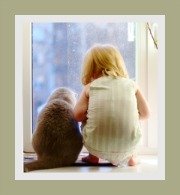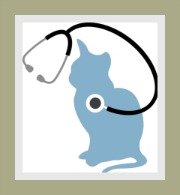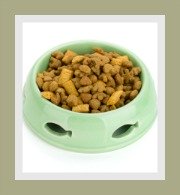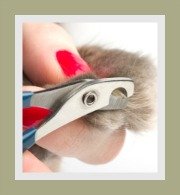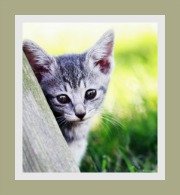Feline Constipation
The Causes and Symptoms
Feline constipation or cat constipation is not a disease but rather a symptom of a problem in the cat's large intestine.
- Is your cat straining when going to the toilet and not
passing any feces?
- Is kitty passing hard, dry stools (feces) or going
to the toilet less frequently?
This may be a sign that your cat is constipated.
If your cat lives indoors and uses a litter box, it will be easier to monitor your cat's toilet habits. If your cat lives outdoors and uses the garden, it will be difficult to check its toilet habits.
It is considered 'normal' if your cat defecates twice a day, but this is dependent on various factors:
- The cat's diet, the amount your
cat is fed and the frequency of feeding will determine how often your
cat empties its bowels.
- As the cat owner, you need to establish what's
'normal' for your cat.
symptoms of cat constipation
There are a number of symptoms associated with constipation and these include:
- Straining to pass stools or difficulty in passing stools
- Frequent and unsuccessful attempts to pass feces
- Cat passes stools less frequently
- Cat has no bowel movements i.e. passes no stools
- The feces that the cat passes is hard, dry and lumpy
- Feces may contain blood
- The cat is restless
- The cat may have a tender abdomen and show discomfort when the abdominal area is touched
- The cat may walk or move in an arched position and even meow in pain when trying to defecate
- Cat may avoid using the litter box and defecate in inappropriate areas of the home
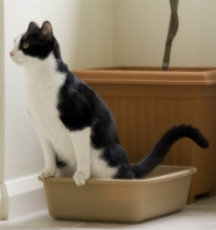
NOTE: It's important to note that cats with a bladder infection (also known as cystitis) or a blocked bladder often strain to pass urine and they tend to use the litter box more frequently without passing any urine.
The signs of cat constipation and bladder problems are similar. It is important for you to establish if the cat is constipated or if it has a urinary tract infection.
We suggest a visit to the veterinary surgeon if you are unsure - a blockage or infection can be serious.
causes of cat constipation
The cause of feline constipation varies considerably. It may be related to something as simple as diet or it may be due to a serious abdominal tumor.
For this reason, you should not ignore the signs of cat
constipation.
Hair Ingestion
Long and shorthaired cats are both at risk of ingesting hair during self-grooming.
This ingested hair results in the
formation of coarse and hard feces intertwined with hair and this
becomes very difficult for kitty to pass.
Bone Ingestion
Free-roaming cats that hunt for birds and rodents often ingest bones and bones can cause constipation (or more serious bowel obstruction and perforation).
Gardeners often use bone meal as an organic fertilizer when planting. Apart from the other health risks associated with ingesting bone meal, it can be very constipating and cat owners need to prevent their cats from consuming it.
Diet
Whilst cats do drink water, they do get a substantial amount of water from their food.
Cats that are fed exclusively on dry kibbles, especially poor quality dry biscuits, may be at greater risk of becoming constipated.
Confinement and Lack of Exercise
Cats that are confined indoors with limited space to exercise are at risk of becoming constipated.
Cats that are boarded in catteries for an extended time may be hesitant to use a litter box and this will result in feline constipation.
Old Age
Geriatric cats are prone to constipation.
This is due to a lack of exercise, a decrease in the contraction of the large bowel and a general decline in the muscle tone of the large intestine.
As the large bowel fails to contract and push the feces along towards the rectum, the cat becomes constipated.
Key Gaskell Syndrome
This condition is also known as feline dysautonomia.
It is defined as a malfunction of the autonomic nervous system, which affects various internal organs including the large intestine. There is a marked degeneration of the nerves.
This results in a decrease in the muscular contractions of the bowel which moves feces along the intestine towards the rectum. This inactivity leads to constipation.
Physical Injury
Sadly, a common injury to cats is caused by tail-pulling.
Pulling the tail causes damage to the nerves and this produces pain when the cat defecates. As a result of this, the cat becomes constipated.
Physical Trauma
An injury to the pelvis (e.g. pelvic fracture) and internal abdominal injuries from a motor vehicle accident causes the pelvic area to become restricted with resultant feline constipation.
Obstruction
A blockage of the intestinal tract may be caused by a cat ingesting a foreign body like a button, string or wool. This is more common in kittens when they are exploring their environments.
Tumors - (benign or
malignant) can also cause a bowel obstruction and this in turn results
in feline constipation.
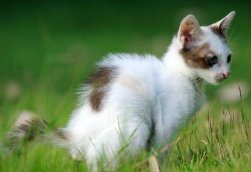
There are various cat constipation remedies - we explore all the options available here.
Related Cat Pages:
Top of Feline Constipation Page
Return to Cat Diseases
search our site
please like us
share our site
recommend on google
favorite pages
